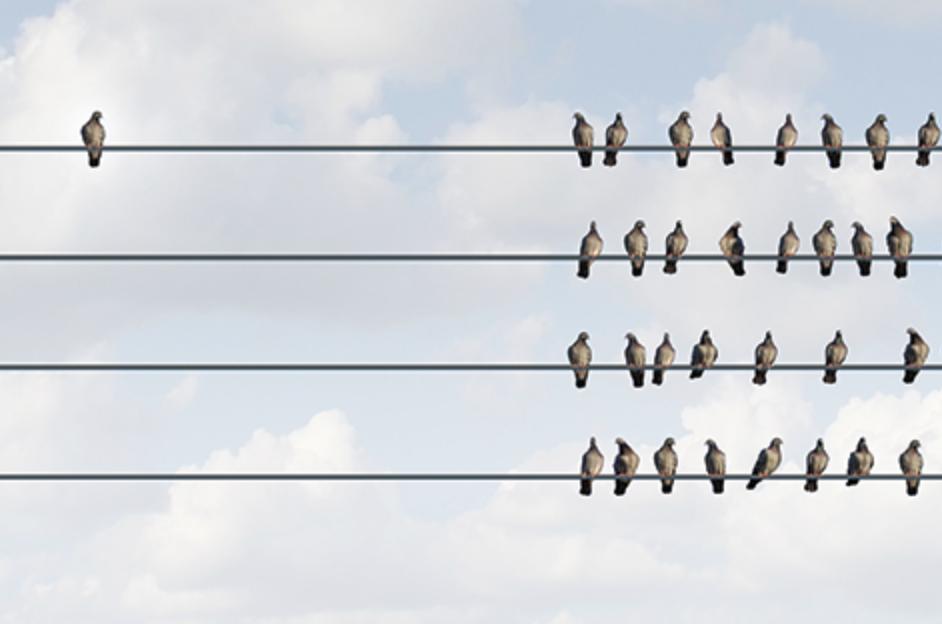Last year I was Director of Human Resources for a nonprofit in Washington, DC. Like most nonprofits, space was at a premium. Three of us worked in a very small office which created challenges but also offered an opportunity for interesting conversations. One Monday morning I asked my 23-year-old colleague how she spent the weekend. She said she played video games with friends. I asked if everyone got together at one of her friend’s homes. “Oh no,” she said. “We were all in our own homes. I was in my pajamas for most of the weekend.”
That got me thinking about the ongoing human interaction situation in America. A recent millennial study showed that many millennials have intense feelings of loneliness and admit to having few close friends. More people live alone in the US than ever before—almost 25 percent. More than half of Americans are not married. Then add to that the fact that almost 30 percent of married people have strained relationships and feelings of isolation. Then consider the strata of older Americans whose spouses have died, in addition to many of their closest friends. I remember visiting my mom who was in assisted living the year before she died and recall my dismay at how many residents never had any visitors. They would stop me on the porch before I entered the building, just to have the opportunity to talk with someone. Emily Dickinson described the quiet devastation of such loneliness as the “the horror not to be surveyed.”
I read an article in the New York Times last year concerning Theresa May’s appointment of a Minister of Loneliness in the United Kingdom. Due in part to Brexit, Brits were feeling increasingly isolated. A report had been issued that more than 200,000 Brits had not had a conversation with another human being in more than a month. She reported that such loneliness can result in heart disease, strokes, Alzheimer’s, depression and anxiety. The aim of this new department would be to connect Brits to appropriate community and volunteer activities.
The irony, of course, which has been mentioned by many, is that we are all more connected than ever before. Through the Internet, Facebook, 24/7 news, etc., it seems almost impossible to disconnect. Teens commit suicide because they don’t get enough likes on their posts. Studies have shown that the more time spent on Facebook, the more depressed people become. Why? Because such time spent creates the illusion that everyone else is happy and active but you.
When you ride the Metro or walk the streets in DC, few people talk to one another. So many have earbuds listening to music or podcasts or something else. It’s as if they are in their own world—shut off from everyone. How many times have you gone out to dinner and seen a couple both looking at their phones and not speaking? I went out to breakfast a few weeks ago and sat next to a couple who literally did not speak to one another the entire meal until the check arrived. She was endlessly texting on her phone; he was reading the newspaper.
So, what to do about all this loneliness amid so much connectivity?
One long-term solution might be mandatory national service by a certain age. Everyone would have to sign up for one year of such service—Peace Corps, Vista, the Armed Services. These services stress the importance of involvement, connectivity, and responsibility.
Another hopeful sign is that many millennials have resurrected game night—getting together in person to play board games such as Monopoly or Scrabble, Trivia, etc.
Also, memberships in clubs—book, theater, art, hiking, biking, birding– are ways to get together around a common theme and meet people with similar interests.
Volunteer activities such as Habitat for Humanity, tutoring children, working at food banks, are also excellent ways to connect with the community.
Participating in mindfulness and meditation seminars has been proven to increase emotional intelligence, productivity, reduce stress and anxiety and in general improve the state of your psyche.
Taking workout classes at a local gym offers an opportunity to meet new people in a different setting as well as becoming more fit.
Mastering an instrument and then developing an informal group can also be rewarding. (I always feel a sense of accomplishment after learning even a simple piece on the piano.)
For those with strong religious affiliations, church groups are another excellent means to connect with others.
Families with small children also find ways to make new friends through soccer and hockey games and practices.
Many corporations are forming softball teams, walking groups, or discussion forums to offer ways to promote a sense of community.
In closing, each of us bears a responsibility to make a concerted effort to have a richer personal life and to contribute actively to our communities. We also need to remember that kindness goes a long way. That means being kind to yourself—less self-critical and more mindful of your inner being, as well as being kind to others—reaching out, giving a helping hand, and being less worried about reciprocal acts. Kindness releases feel-good hormones, reduces stress, and can improve physical health. And as the wise Bruce Springsteen once said, we all need “just a little of that human touch.”
Maria Grant served as principal-in-charge of the Federal Human Capital Practice with Deloitte Consulting. Since her retirement from Deloitte, she has focused on reading, writing, music, travel, gardening, and nature.



Muriel Cole says
I LOVE the idea of mandatory national service. An idea whose time has come in the U.S.!